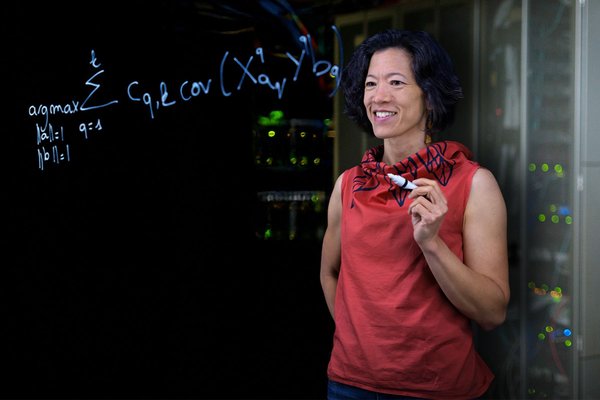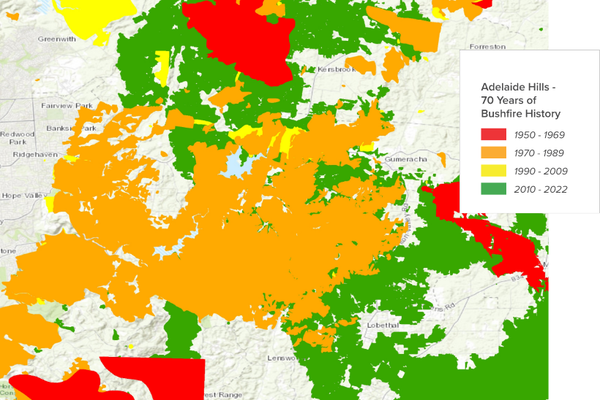Recognising the indispensable: the Eureka Prize for Excellence in Research Software
Research software is an enabler: most modern researchers rely on it to analyse data, a cornerstone of scientific output. Just as collecting and analysing data takes effort and highly specialised skills, so too does the development of software. While the majority of researchers say that their work wouldn’t be possible without the use of software, its critical role in the science community has traditionally gone unrecognised. The Australian Research Data Commons (ARDC) Eureka Prize for Excellence in Research Software represents a significant step toward making these efforts more visible. We sat down with Rosie Hicks, Chief Executive Officer of the ARDC, to unpack one of the most recent additions to the Eureka Prizes program.

Rosie Hicks is the CEO of Australian Research Data Commons, Australia’s peak body for research data and sponsor of the Eureka Prize for Excellence in Research Software.
Image: Australian Research Data Commons© Australian Research Data Commons
Can you tell us a bit about the Australian Research Data Commons’ purpose and mission?
The ARDC accelerates research and innovation by driving excellence in the creation, analysis and retention of high-quality data assets. We partner with the research community and industry to build leading-edge digital research infrastructure that provides Australian researchers with competitive advantage through data. The ARDC is funded by the Australian Government’s National Collaborative Research Infrastructure Strategy (NCRIS).
What role does research software play in the science community?
Those working on the frontiers of research need highly specialised software to create, handle and analyse data, and therefore rely on it. Despite being an essential element in the scholarly research infrastructure ecosystem, this software is often invisible. Not only does it go uncited in journal papers, but the researchers who create and maintain it are rarely recognised for their skill and effort. Because software specifically developed for use in research requires a rare combination of deep research knowledge and technical competency to be produced. Traditional research, however, only incentivises the production of academic papers, not software.
Those working on the frontiers of research need highly specialised software to create, handle and analyse data
Sometimes innovation in software lies within the development of new methodologies, and this is when entirely new approaches to our understanding of the world are captured as software. For instance, time series analysis occurs in a very broad array of fields, from economic forecasting to speech signal processing. How this is done emerges from research through the creation of new methods, and these methods are made usable through software. When new methods and models are more broadly accepted, they start to enter research and services that impact on our everyday lives. With the increase in available data, as well as the computing power to analyse it, the need for robust and applicable software in research has also increased.
Unlike peer-reviewed papers, high-quality research software allows researchers to actually use the specialised methods and models that are described in papers. This is why the ARDC has established a national agenda to recognise software as a first-class research output. We consulted widely with Australia’s research sector to produce the agenda and now we’re working collaboratively to deliver it.
The Eureka Prize for Excellence in Research Software is awarded for the development, maintenance or extension of software that has enabled significant new scientific research. Tell us more about the prize purpose.
This award recognises the role of developing and maintaining software as a critical part of research and innovation in Australia. Many researchers realise that they can’t conduct modern research without this valuable tool and admit that its existence has greatly accelerated their work. While some of the most cited papers of all time describe computational methods and models, the practice of formally acknowledging the software used to produce research is not yet common or consistent. Recognising its value is, however, critical for its sustainability.

AstroPy is an example of an open-source research software project with contributors from all around the world.
Image: NASA© NASA
Software for research is often built under the leadership of experienced senior researchers, but those at early and mid-career stages undertake the labour. An effort might consist of a combination of senior leaders and a small team, who work over many years to build robust software for broad consumption by a range of users. It could be a series of contributions by Australia-based researchers to larger efforts such as AstroPy, where expertise is folded into one component of an international effort. Or it may be the work of one individual over many years, using their knowledge to keep highly specialised software running for the research community’s use.
The Eureka Prize for Excellence in Research Software celebrates both the leadership and effort that underpins this work. We see it as an opportunity to recognise what most at the coalface of modern research already know: that we can’t undertake innovative new research without the ongoing availability, stability, robustness and integrity of this software.
The Eureka Prize for Excellence in Research Software represents an opportunity to acknowledge the value of many different contributions
This prize has been updated for 2025 to include prize criteria that encourages diversity and inclusion. Could you explain why this is an important addition, particularly in the field of research software?
Adding diversity and inclusion criteria to the Eureka Prize for Excellence in Research Software is needed to ensure that the award is accessible and beneficial to a wide range of individuals and communities. We know that diverse teams outperform homogeneous teams and we want to see if this is reflected in the candidates. We don't only count for diversity in teams but for intentional efforts towards inclusivity in and out of the team, such as the beneficiaries/users of the software. By clearly stating the diversity and inclusion criteria we attract a broader pool of worthy applications to emerge. We want to set an example of what a healthy community looks like when we refer to the creators of research software.
Who might consider entering this prize?
Leaders of team efforts to produce — and especially maintain — software upon which research depends are invited to apply for this prize, as are developers, maintainers and contributors. Entries from both individuals and small teams are eligible, and where a project has been sustained over many years by successive contributions (from post-doctoral researchers, for instance) we urge teams to recognise this succession of contributions in their entry.
Some open-source projects in research like AstroPy or Scikit-learn are enormous, with contributors from all over the world, and individuals in Australia who are involved in these collective efforts are encouraged to submit. Those in both academic and other professional positions who have contributed to applicable projects are eligible to enter. So, if a highly specialised scientist has acquired software development skills, or a skilled software engineer has come to work closely with scientists to produce a program, they might consider submitting an entry.
Most software in research is developed as open-source, but some efforts are closed-source commercial software — projects that employ either mode of sustainability are welcome to enter. Research is not the exclusive domain of academia, either: there are, for example, some fantastic efforts used to deliver citizen science projects, which deserve wider recognition.
If you are a researcher that depends on software for your work, take a moment to explore where and how it is both developed and maintained. Should you find that this effort (in full or part) is based in Australia, consider either nominating the developers directly or contacting the authors to suggest they submit an entry. Software is such a pervasive part of modern life that we don’t often stop to think about where it comes from, the incredible work that goes into its development or the continued effort required to keep it working.
The Eureka Prize for Excellence in Research Software represents an opportunity to acknowledge the value of many different contributions!

GPlates is open-source software that brings geodata to life by tracing tectonic shifts over geological time. Through virtual models of Earth’s systems, GPlates helps researchers better understand our planet's complex geological history and possible future. The team behind the software was recognised as a finalist in the 2023 Eureka Prize for Excellence in Research Software.
Image: University of Sydney© University of Sydney
What are some of the practical impacts that the broader community might observe in their day to day lives due to these developments?
Consider the coronavirus pandemic, which has had a profound impact on daily life. It’s because of research software that we’ve been able to understand and predict the spread of the disease and estimate the impact measures to constrain it. This involves bringing together large data collections and then constructing models to analyse them. Tracking changes to the genetic code of viruses requires special software to analyse enormous amounts of data to measure the distance between variants as they develop. The winner of the 2023 Excellence in Research Software — IQ-TREE2 — does exactly this. These activities all need to be carried out both robustly, at a high speed, and at scale. Similarly, understanding how the climate changes over time involves sophisticated modelling of several observable phenomena with enormous amounts of data.
Research software is a uniquely useful way to share knowledge.

The ARDC's Dr Tom Honeyman discusses research software at the International Funders Workshop: The Future of Research Software, hosted by the Research Software Alliance (ReSA) and the Netherlands Science Center in November 2022.
Image: Annelies Verhelst/Netherlands eScience Center© Annelies Verhelst/Netherlands eScience Center
What excites you most about this field of science?
Research software is a uniquely useful way to share knowledge. When a researcher lays down their ideas as software, they are unlocking it for more widespread use and when developed openly, another researcher can come in and see precisely how they are expressing their ideas. This is such a different way of working than through academic journal papers. We see it as a broader change in the way that modern research is occurring and are excited to help accelerate this transformation.
The Australian Museum Eureka Prizes are the country’s most comprehensive national science awards, honouring excellence across the areas of research & innovation, leadership, science engagement, and school science.











